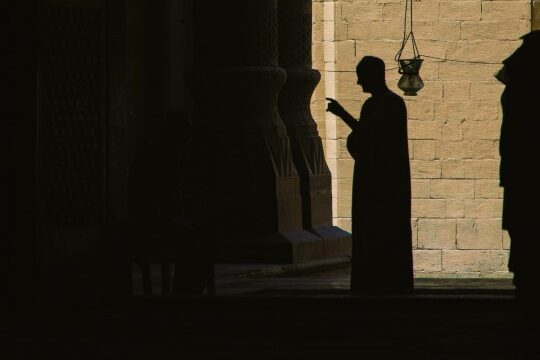It is evident from the definition of the term kashf that it refers to a hidden knowledge of a tremendous nature, and that is what Ibn `Arabi meant by saying “the secrets of Allah Most High,” as is alluded by continuation of the hadith of Abu Hurayra mentioned above:
I have stored up from the Prophet two large vessels of knowledge. One I have disseminated among the people; if I were to disseminate the other, they would cut my throat.
Imam Bukhari said: “The Knowers (al-`ulama’) are the inheritors of the Prophets, that is: they have inherited (their) knowledge.”54 The first part of his statement is actually an authentic hadith of the Prophet.55 Thus it is beyond anyone’s reach to put limitations on the gifts Allah bestows on His Friends, except that we give such gifts different names – mu`jiza or karama — depending whether the recipient is a Prophet or a saint. Nor is it impossible that some saints of the Prophet’s Community, like the Prophet himself, do know the Unseen except for what Allah hides from them and reserves to others of His creatures — such as angels — or exclusively to Himself, according to His will.
The inheritorship of the Prophet’s knowledge by the great scholars is illustrated by al-Khatib’s relation from al-hafiz Abu Nu`aym already mentioned, whereby Abu Nu`aym considered it incumbent upon all Muslims to invoke Allah for Abu Hanifa in their prayer due to his preservation of the Prophet’s Sunan and fiqh for them.56 Another example is the following account about Imam Malik related by Ibn al-Jawzi in the chapter entitled “Layer 6 of the People of Madina” of his book Sifat al-Safwa:
Abu Mus`ab said: I went in to see Malik ibn Anas. He said to me: Look under my place of prayer or prayer-mat and see what is there. I looked and I found a certain writing. He said: Read it. (I saw that) it contained (the account of) a dream which one of his brothers had seen and which concerned him. He said (reciting what was written): “I saw the Prophet in my sleep. He was in his mosque and the people were gathered around him, and he said: I have hidden for you under my pulpit (minbar) something good — or: knowledge –and I have ordered Malik to distribute it to the people.” Then Malik wept, so I got up and left.57
Observe the attitude of the awliya towards the meeting with the Prophet in dream and their strong belief both in the absolute credibility of such dreams and their particular contents. This one explicitly states that the Prophet has kept something good hidden for his Umma, and that he continues to give it through one of the greatly learned `ulama after his time.
Similarly Imam Ahmad cited in Kitab al-zuhd, also Ibn Abi al-Dunya, Abu Nu`aym, Bayhaqi, and Ibn `Asakir from Julays from Wahb ibn Munabbih who said: I saw the Prophet in my sleep, so I said: “Ya Rasulallah, where are the Substitutes (budala’) of your Community?” So he gestured with his hand towards Syria. I said: “Ya Rasulallah, aren’t there any in Iraq?” He said: “Yes, Muhammad ibn Wasi`, Hassan ibn Abi Sinan, and Malik ibn Dinar, who walks among the people similarly to Abu Dharr in his time.”



